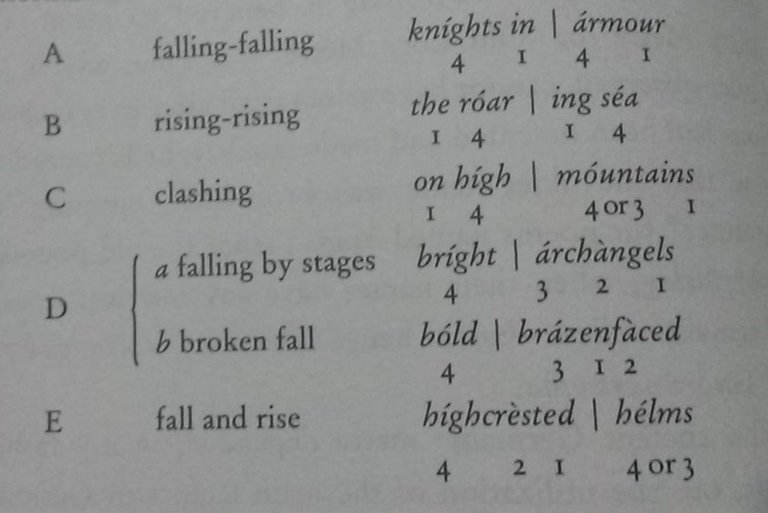In the past year, I read two books by J.R.R. Tolkien - King Arthur and The Legend of Sigurd and Gudrun. Both of these books have a similar alliterative style. In the notes for both books, Christopher Tolkien gives some details about the general rules that English poets followed long, long ago.
(The following is my summary of the main ideas found in King Arthur, Appendix: Old English Verse, and The Legend of Sigurd and Gudrun, Introduction 5: The Verse Form of the Poems. That is followed by two of my attempts at the style.)
Each line of the poem was made up of two halves, and each of these halves was also divided, so that there are four parts to each line. The parts of the lines that must alliterate are the first and third. The second may also match them, and the fourth must never match.
Additionally, the stress of the syllables was important. The long, stressed syllables were what they cared about alliterating. There were some basic forms that each half-line took, as shown in this photo (page 46 of The Legend of Sigurd and Gudrun):

Those are each half of a line, so a full line would be a combination, in any order, of any two of those. Christopher Tolkien points out that these follow the normal flow of the English language, but the structure of these poems cuts out the extra stuff so that just the more interesting parts remain. Because there is no set number of syllables per line, the poems get their flow from the sounds and the general balance of each of these half-lines.
Also, vowel sounds of any kind alliterate with each other, so that makes some things easier.
Here are the first four lines (the first sentence) of King Arthur to give an example of what Tolkien did with this in Modern English:
Arthur eastward in arms purposed
his war to wage on the wild marches,
over seas sailing to Saxon lands,
from the Roman realm ruin defending.
I fell in love with the sound of his poems, so I have tried writing some of my own. However, I have been relatively lax so far about the stress of the syllables. I have just been trying to make what seems to me to be the strongest parts match up without going into careful detail. I gave an example of this in my introduction a few days ago, and below are two more attempts (super dangerous to put my own poetry up alongside Tolkien's for comparison :D ).
I would like to improve, so please do not spare me. If whole lines or stanzas are terrible and need reworking, I would be happy to know so that I can rework them and improve. Thanks for reading! Also, thanks to @geekorner, who looked over these already and identified the weakest lines. He has not seen the changes yet though, so their current state is all on me. :)
Reassigned to Rigel III
The glasses clinked, gleaming dully,
in the dim light, dust littered.
"Four years have gone, flown by, really.
I've enjoyed all of our good times."
"Hank, you know you're highly regarded.
We hate to lose one so skilled,"
said Martin, the oldest, manager of the dozen,
nodding their heads, new and old.
"Ah, I have but one hour left.
Traffic can get tangled 'bout now."
So saying, Hank stood suddenly
and crossed the familiar, creaking floor.
"Godspeed to you!" "Goodbye!"
The farewells were finished, and,
without ceremony, wanting none,
Hank left his home of four years.
As he settled in at the controls,
and buckled himself, briefly he glanced
toward town, the tall monolith
of his company clearly he saw.
Then, refocused, the red button
he hit, and shortly hurtled the ship
into space, away from friends,
not knowing he'd never return.
The Stand
The dropships descend dangerously close
to the encircled few overwhelmed.
Shots ring out, singing through
the fierce foes, felling scores.
Marines emerge, masked and armored.
Bright-colored blades flash
in the smoke-filled sunset
while lightning crackles loud and near.
The great warhorns of the greyskinned
warriors blare and warble gladly.
Joyously, they jeer and greet
the marines with a mad bloodlust.
"Spawn o' hell!" "Surprised ya?"
"Why're you here?" "We can't
believe you wanted to beat us to
the order of the honored dead."
So saying, the soldiers turn
and fight their final battle.
A friendship forged four decades past,
tested and tried, true to the end.

Hi @whoshim! OK... I had also been looking at some of the alliterative rules of ancient poetry when I was interested in writing an epic poem that played off Beowulf. I ended up with a 65-stanza poem with no consistent rhyme scheme, but a lot of alliteration, though not following any rules regarding lines. Just to give you an idea, this is the first stanza of "Grendel's Aunt":
Hymm was a hero, hawkish for war:
a savior without a... save-ye.
At our ditty's beginning we find this young lad
on the prowl and hunt for a wee bit of knaving:
searching for weaklings in gingham or plaid,
or a nyrd with the need of his saving.
(And there was a lot of rhyme, just nothing consistent.) Anyway, I found doing this that meter was very important to me - are you wanting to work in any specific meter here?
Knockout alliteration @whoshim and I love these lines:
A friendship forged four decades past,
tested and tried, true to the end.
Also like great warhorns & greyskinned warriors.
But I think a meter would add to these poems, especially the second one with its driving war theme. For example, if I might play with these lines:
Joyously jeering and greeting marines
with a maddening, bloodlusty blare!
something like that?
Thanks for the response! I scanned through your posts, but I did not find any about your poem? Have you put it up anywhere? Also, I was surprised to see your large collection of posts on economics, and I plan on digging into those and hopefully using them with my kids.
Regarding:
A friendship forged four decades past,
tested and tried, true to the end.
The second line was because @geekorner told me the original was bad. :D
Concerning meter, I really like the two lines that you wrote, but I am really aiming for Tolkien's style. Right now I am not so good at it, so things aren't as balanced as they should be. In order to do the style, I have had to pass up some great alliterations (such as your 'bloodlusty blare'), because the fourth stressed syllable should not alliterate with the third.
That pattern of alliteration, when done right, gives the lines a flow where the last part is kind of a drop-off, and the next line picks the pace back up. While it doesn't give the same feeling as a set meter, it definitely gives it a clear and distinct sound, which is felt when reading the poetry aloud.
Maybe the best comparison I can give of how it feels is that, for example, your lines:
Joyously jeering and greeting marines
with a maddening, bloodlusty blare!
have a kind of music to them, while Tolkien's:
Arthur eastward in arms purposed
his war to wage on the wild marches,
over seas sailing to Saxon lands,
from the Roman realm ruin defending.
have the feel of a chant. That doesn't quite state how I feel, but I am unsure how else to describe it.
Ah! Ok, sorry - I didn't fully absorb the Tolkien pattern there. But yes, I see that now.
Regarding my poem, I wrote it last year, so you'd need to scroll back much, much farther. I tend to write about economics, whether it's non-fiction, fiction, or poetry. Right now I'm doing a non-fiction series.
I'm going to try to get more familiar with Tolkien's chant-like feel and see if I can start thinking in his pattern. If I can think it doing housework, I can write it. 😃
The first poem has such a nice flow. It's sort of a shame that it lacks any actual emotional impact or any reason to be poetry rather than prose. It does feel like it could be the beginning of a longer piece.
The second piece is much better in terms of atmosphere and imagery, though the flow is slightly worse.
A great start to this endeavour :D